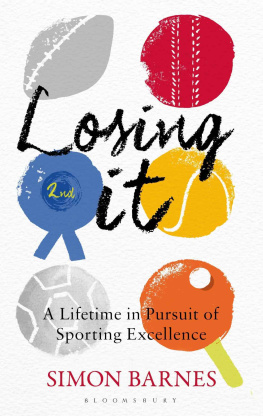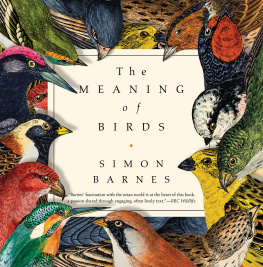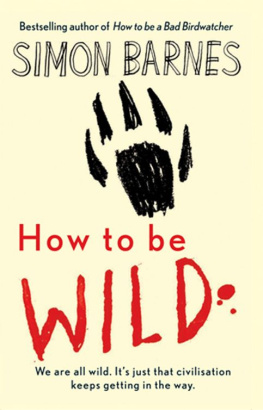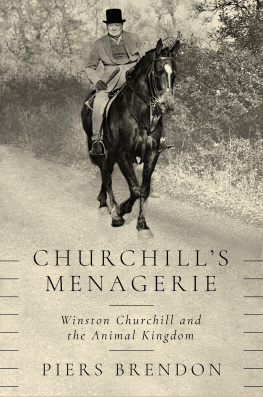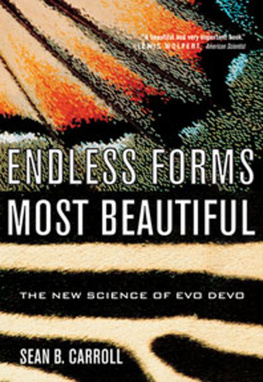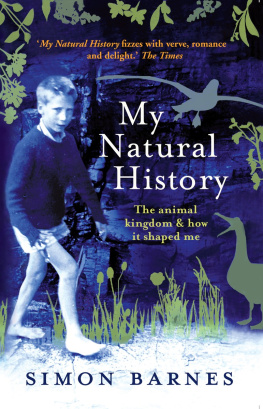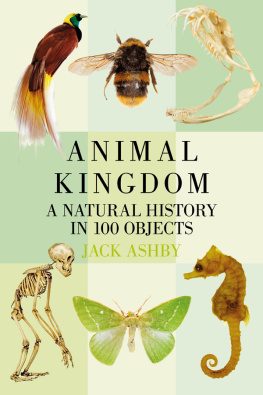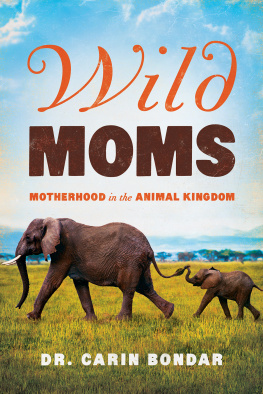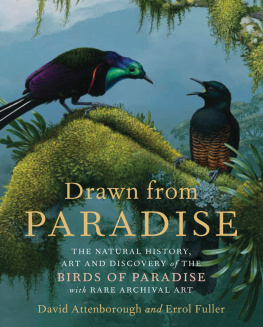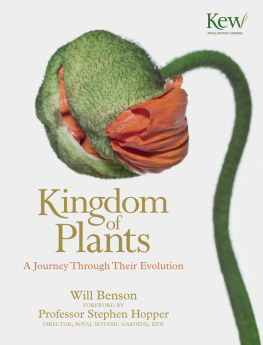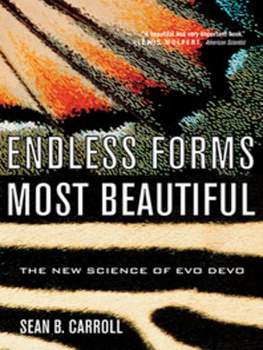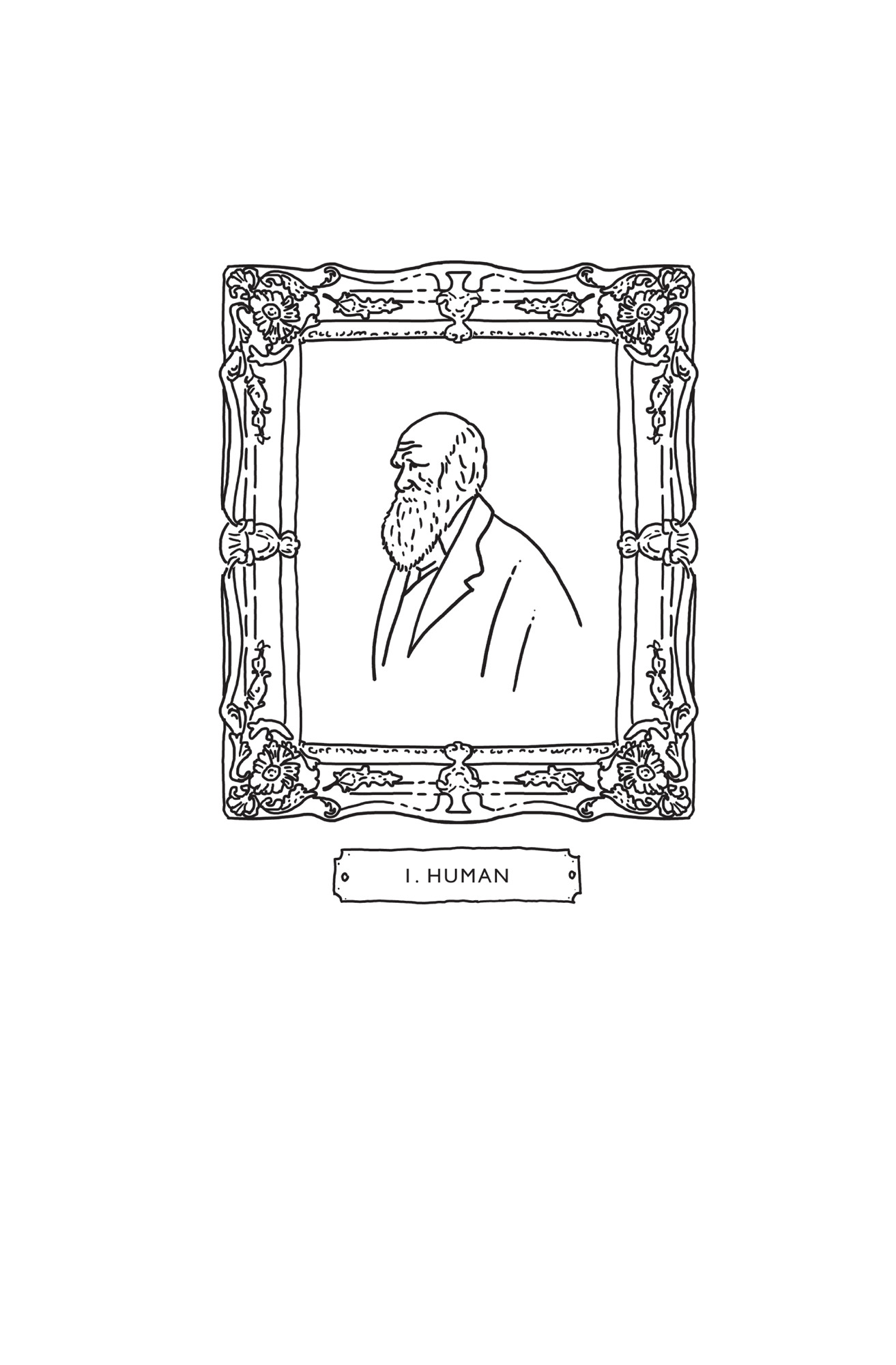Thank you for downloading this Marble Arch Press eBook.
Join our mailing list and get updates on new releases, deals, bonus content and other great books from Marble Arch Press and Simon & Schuster.
C LICK H ERE T O S IGN U P
or visit us online to sign up at
eBookNews.SimonandSchuster.com
We hope you enjoyed reading this Marble Arch Press eBook.
Join our mailing list and get updates on new releases, deals, bonus content and other great books from Marble Arch Press and Simon & Schuster.
C LICK H ERE T O S IGN U P
or visit us online to sign up at
eBookNews.SimonandSchuster.com

Marble Arch Press
1230 Avenue of the Americas
New York, NY 10020
www.SimonandSchuster.com
Copyright 2014 by Simon Barnes
Originally published in 2014 in Great Britain by Short Books.
All rights reserved, including the right to reproduce this book or portions thereof in any form whatsoever. For information, address Atria Books Subsidiary Rights Department, 1230 Avenue of the Americas, New York, NY 10020
First Marble Arch Press hardcover edition February 2015
Marble Arch Press is a publishing collaboration between Short Books, UK and Atria Books, US.
Marble Arch Press and colophon are trademarks of Short Books.
Cover design and illustrations by nathanburtondesign.com
Library of Congress Cataloging-in-Publication Data has been applied for.
ISBN 978-1-4767-3035-6
ISBN 978-1-4767-3036-3 (ebook)
To the great teachers --
especially
Mr Hendry Pete late of Emanuel School, who taught me about words and books and Joyce,
Sir David Attenborough, who taught me about the wild world and Darwin,
and CLW who taught me practically everything
Contents
INTRODUCTORY CHAPTERS
INVERTEBRATE CYCLE
VERTEBRATE CYCLE
EPILOGUE
Here Comes Everybody
James Joyce, Finnegans Wake
Endlessness
endless forms most beautiful and most wonderful have been, and are being, evolved. Final words of The Origin of Species by Charles Darwin. It is a thought that has had me enthralled all my life. We are not alone in the universe: the idea that launched a million works of science fiction. Fact is we are not alone on our own planet. Far from it. We could hardly be less alone. We are one of a crowd, part of a teeming throng. We are not alone even when we are alone: whether we are counting the great garden of bacteria in our guts alien life forms that keep us alive or the tiny arthropods called Demodex mites that live in the follicles of our eyelashes.
Because we are one of many. Life is not about the creation of a single perfect being. An ape is not a failed human: it is a perfectly valid and fully evolved creature in its own right. A monkey is not a failed ape, a lemur is not a failed monkey, a mouse is not a failed primate, a fish is not a failed mammal (and as I shall show you later, there is no such thing as a fish) and insects, nematode worms, corals and priapulids are not failed vertebrates. The meaning of life is life and the purpose of life is to become an ancestor. All forms of life are equally valid: the beautiful, the bizarre, the horrific, the obscure and the glorious.
We humans are different from the rest in some ways, but only in some ways. One of these ways is our need for a myth to get us through the night: a myth to carry us through the vast distances of interstellar space: a myth to transport us through the endless aeons of time in which life has been lived on earth, a myth to reconcile us to our true evolutionary position. Which is a cosmic afterthought.
We used to cherish the myth that we are made of quite different stuff from the animals: there are animals, and then theres us. Darwin exploded that one, of course. He showed us that we are all animals, but that is too difficult a truth for us to face in its rawness and reality. So we have created another myth. Benjamin Disraeli, speechifying about Darwins horrifying truth, said: The question is this: is man an ape or an angel? I, my lord, am on the side of the angels. I repudiate with indignation and abhorrence these new-fangled theories.
But evolution is a fact and we humans lets dispense with Disraelis man nonsense; were all in it together, men, women and children needed to come to terms with our apeness, our primateness, our mammalness, our vertebrateness, our animalness. So we came up with perfectibility: the idea that evolution had a goal, that goal was to make a perfect creature, and that perfect creature is lucky old us. The famous image of evolution monkey, ape, hunched proto-hominid, fully evolved and upright modern man encapsulates the myth as vividly as a cross, a crescent and a seated Buddha encapsulate the great world religions. The whole process of the Animal Kingdom, starting with unicellular blobs and passing through insects, fish, amphibians, reptiles and birds, culminates in mammals, and mammals carry us through primitive egg-layers and marsupials, to creatures of ever-greater magnificence and complexity, to the primates and then the apes, until the ladder finally ascends to wonderful, glorious, magical us.
Which is great. Except of course that it doesnt.
The mite that lives in the follicles of your eyelashes is as fully, as exquisitely, as perfectly evolved as you are. And on that thought, I shall set out to describe the endless forms of the Animal Kingdom, to encounter the ten million alien species with which we share our planet. To do so righteously, I must write a book that has no beginning and no end, but like James Joyces Finnegans Wake , simply continues.
Ten million aliens, then. Or is there really only one? Perhaps the only alien species on the planet is us. Certainly we are alienated from the rest of creation: so much so that we have become tourists on our own planet. What all tourists need is a travel guide: so here you are. Look on this book as the Rough Guide to Real Life: the Lonely Planet Guide to the Lonely Planet.
. In this book Im modestly restricting myself to the Animal Kingdom. In Britain four other kingdoms are traditionally recognised: Plantae, Fungi, Protoctista and Prokaryota/Monera. In the United States they prefer six: Animalia, Plantae, Fungi, Protista, Archaea and Bacteria.
Sex and the single slug
This is the ideal point in the book for a quick lesson in basic taxonomy, so lets talk about sex instead. I may not be able to teach you how to love slugs, but I can certainly teach you how slugs love. Slugs are invertebrates molluscs, since you ask and as such, less than the trash beneath a vertebrates feet. But they live lives of sensuous and sometimes violent passions and go in for the most bewildering and perhaps even enviable gymnastics.
We are brought up to despise most invertebrates, especially the slimy ones. I quote an exchange in Australias federal parliament in 2006. Julia Gillard, a Labour front-bencher: Mr Speaker, I move that that snivelling grub over there be no further heard. Speaker: The manager of the opposition will withdraw that. Gillard: If I have offended grubs I withdraw unconditionally.
But we should warm to slugs if only for their sex lives: creatures whose antics outdo anything thought up by Messalina, Zeus and all those carved and writhing figures on the Konark Temple. As gardeners wage war on slugs with beer and eggshells, so slugs pursue their exotic and passionate lives. There are about 5,000 species of slugs in the world, and 32 of them in Britain, where the cold limits the things a slug can get up to. Slugs are related to snails, and are not unlike shell-less snails, except that to be confusing and life and biodiversity are confusing almost by designare three species of shelled slugs in Britain. Being molluscs, slugs are related to giant squids but well save them for later.
Next page



